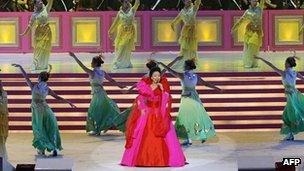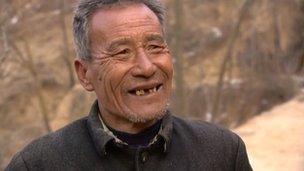Xi Jinping: Cave dweller or princeling?
- Published
- comments
Will Xi Jinping be China's next leader?
Who is Xi Jinping? It's not an easy question to answer.
The man the Communist Party is busy grooming to be China's next leader can be read in so many ways.
He is a communist "princeling," the equivalent of royalty in the Party, born into power and privilege but who then lived in a cave.
He is a man who has spent his life in the Communist Party but who knows what it is like to be outcast.
He has convinced businessmen he is their champion, while overseeing a system where the state controls huge chunks of the economy.
He has shown himself to be irritated with foreign criticism of China but has sent his daughter to study at Harvard under a false name to hide her identity.
His wife, Peng Liyuan, a singer, has, for most of his career, been far more famous than he has.
When he was first announced as China's next leader-in-waiting, he was already vice-president, but people still joked: "Who is Xi Jinping? He is Peng Liyuan's husband."

Xi Jinping's wife Peng Liyuan is a well-known performer in China
Xi Jinping is full of contradictions. That is probably why he has risen so far - and is now poised to be promoted to the very top of the Communist Party.
He is a man who can appeal to almost everyone, but who seems to have alienated almost no-one in his rise through the ranks. He appears confident and open while giving away little.
He is a consensus candidate, a compromise who the factions in the communist hierarchy can unite behind - a figure China's disparate people, from its wealthy to its poor, its party members to its private businessmen, can all accept.
Cave dwelling
One place to get an idea of what has formed Xi Jinping is the village of Liangjiahe in Shaanxi province. It lies down a long winding valley hundreds of miles inland from Beijing.
The earth is yellowish, dry and crumbling. Cave houses line the hillside - they are dwellings dug into the rock, bricked up at the front.
This is one of China's poorest regions. Xi Jinping was sent here when he was a teenager during the Cultural Revolution, to labour in the countryside.
He had been born into a very different life.
Xi Jinping was a 'princeling.' His father - Xi Zhongxun, a hero of the Communist Revolution - rose to be a vice premier. As a boy Xi Jinping lived in the leadership compound in Zhongnanhai in Beijing.
But in 1962 his father fell out with Chairman Mao, was purged and sent to prison. So Xi ended up, all alone, in Liangjiahe, where he lived for almost seven years.
Villagers turned us away when we asked to see the cave dwelling Xi lived in: digging too deep into the past of the man who might be president is not welcomed.
But for Xi Jinping the time he spent here is important to his image. The Communist Party wants to portray him less as a privileged princeling, more as a man who has experienced the life of some of China's poorest people.
'Eaten bitterness'
Not far from the cave where Mr Xi lived, Mr Yuan and his family have their own cave home. A donkey is one of the few things they own.
"Life wasn't good 40 years ago. When Xi was here it was really hard," says Mr Yuan.
"People who met Xi Jinping said he was a good man. He laboured hard. I heard that he was nice to other villagers," Mr Yuan adds.
The Yuan family get no vote when it comes to choosing China's next president, but what they think of the Communist Party's choice still matters.

If Xi Jinping became leader it would be good for us, says cave dweller Mr Yuan
"Xi Jinping lived here, he knew this place, if he becomes leader it will be good for us," says Mr Yuan.
One of the biggest challenges a President Xi will face will be dealing with China's huge and growing inequalities. So his image as someone who has "eaten bitterness" living in Liangjiahe is useful to the Communist Party.
Living in a cave may also have toughened Xi Jinping. He has little time for China's critics. On a trip abroad three years ago he showed a flash of irritation - lashing out at foreigners in some of the only unguarded comments he's ever really made.
"Some foreigners with full stomachs and nothing better to do point fingers at us. But we don't export revolution, hunger or poverty, nor do we cause trouble for you. What else do you want?"
But for most of his career Xi Jinping has been notable for the way he has avoided making enemies while being promoted by Party leaders.
After leaving Liangjiahe, Xi Jinping eventually headed to the busy coastal provinces that are China's economic engines.
He became the most senior party official overseeing first Fujian, then Zhejiang and finally Shanghai.
The city of Wenzhou in Zhejiang, famed as China's most business-minded place, is a world away from Mr Yuan's cave.
Shoppers browse in glitzy shopping centres for products from Christian Dior and Chanel. Range Rovers and Audi SUVs weave through the traffic.
But exports and the economy are now slowing, so the urgent task for China's next leader will be to find ways to keep the country growing.
That may be another reason why Xi Jinping has been chosen by the party.
Businessmen in Wenzhou remember Mr Xi as a pragmatic and business-friendly party chief who encouraged private enterprise.
Zhou Dewen met Mr Xi several times. "Xi spoke up for private businesses, saying they are a crucial component of the economy. State-owned companies are powerful and monopolise many resources. Xi Jinping created an environment for private and state businesses to compete fairly."
"Xi Jinping is a firm but pragmatic leader, someone who can be accepted by all," he adds. "The party elders like him because he is steady and solid. But he is prepared to innovate too."
According to Mr Zhou, Xi Jinping's strength is his broad CV.
"Mr Xi started from the grass roots. He worked his way up. He knows how hard the lives of rural people are.
"He knows the flaws in a planned economy. He is the son of an old revolutionary. He believes in communism and the party's doctrines. He is recognised and trusted by all sides.
"I believe this is exactly the kind of leader China now needs."
So Xi Jinping, the compromise candidate, the relative unknown, has emerged as China's communist leader in-waiting.
His image is being burnished. The next question is what lies beneath the contradictions?
What will he do to tackle the many, pressing issues China's next president will face?